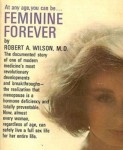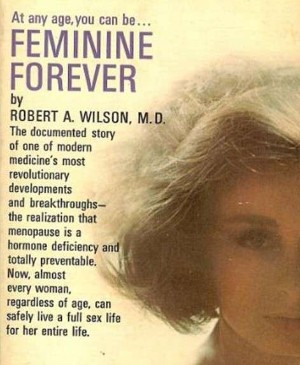
 Robert A. Wilson, Feminine forever (1966)The history of “menopause” as a medical category revolves around gender relationships.
Robert A. Wilson, Feminine forever (1966)The history of “menopause” as a medical category revolves around gender relationships.
If “menopause” as a category of thought seems obvious in our social environment, it is, nonetheless, a product of history. This medical category has transformed along with the evolution of perception and knowledge about the body.
The term “menopause” appeared at the beginning of the 19th century and before that, medical treatises referred to “cessation of menstruation”, then the authors of the Enlightenment mentioned the concept of “critical age”.
In 1821, the term “menopause” is used for the first time by a French doctor, Charles de Gardanne in his book De la menopause ou de l’âge critique des femmes. “Menopause” is thought of as a medical category during a time when biology and human categorisation are combined to create a new body epistemology.
To the previously dominant unisex model, which didn’t categorise body fluids and the representations of the climacteric were common to both sexes, the two-gender system brought out specific feminine biology, as shown by the work of Thomas Laqueur. However, the binary classification of gender led to its prioritisation. With the invention of the category “menopause”, emerged a distinctly feminine concept of transformation and imbalance. It justified gender-based socialisation, and fuelled the representation of a feminine body subjected to a cyclic and precarious constitution, marked by an unstable nature as opposed to a constant and balanced male body, less unstable because less “natural”.
Regardless of the explanatory aetiology, menopause is described as disequilibrium and associated with various illnesses. At the beginning of the 19th century, in the context of the humoral theory, doctors explained menopause as a lack of strength to discharge the blood. “The diseases affecting women during the critical age are so numerous”, warned Charles de Gardanne in his book published in 1821, in which he associated menopause with fever, inflammations (of the skin, eye, mouth, tonsils), joint diseases, ulcers, boils, ophthalmias, angina, pharyngitis, haemorrhoids, uterus ulcer, uterus cancer, breast cancer, polyps of the matrix and vagina, blood apoplexy, blood vomiting, headache, hepatitis, gallstones, genital pruritus, inflammation of the matrix, rheumatism, epilepsy, paralysis … Meanwhile, at the end of the century, psychiatry established a link between menopause and mental disease.
“We can therefore affirm with the most illustrious alienists that menopause is an unmistakable cause of madness”, warned Dr Guimbail in De la folie à la menopause (1884).
This approach to menopause, marked by its pathologization, was renewed by the hormonal approach to the human body that supplanted the humoral theory at the beginning of the 20th century. Therefore, the notion of sexual hormones defined menopause as a hormonal deficiency. Over the century, menopause was at the centre of a process of medicalisation. The American gynaecologist, Robert A. Wilson, sustained during the 60s that menopause is a pathology due to a lack of hormones, such as diabetes or thyroid dysfunction. In his book, Feminine Forever (1966), he wrote “menopause is a dysfunction threatening the ‘female essence’ ”. The representation of oestrogens as the source of femininity fuelled the medical concept that linked menopause and the exclusion of femininity.
Contemporary medical work describes menopause as an involution, more than a transformation. It is associated with a specific symptomatology, a hormonal deficiency and predisposes to cancer and osteoporosis. Disorders and symptoms are directly related to menopause and aren’t considered a probability anymore. These discourses are built on representations defining femininity based on fecundity: the hormonal deficiency and thus menopause is defined after endocrine measures of women of reproductive age, taken as standard.
The medical discourses perpetuate representations of ageing based on genders, making menopause the beginning of earlier ageing more prejudicial for women than men.
To be read on DicoPolHiS : Anorexia- Clitoris- Female delirium
References :
Cécile Charlap, La Fabrique de la ménopause, Paris, CNRS, coll. « Corps », 2019.
Thomas Laqueur, La Fabrique du sexe. Essai sur le corps et le genre en Occident, Paris, Gallimard, 1992.
To quote this paper : Cecile Charlap, "Menopause" in Hervé Guillemain (ed.), DicoPolHiS, Le Mans Université, 2022.